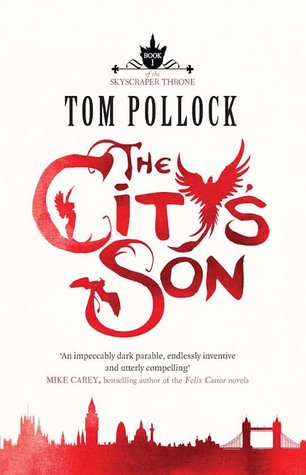Starting with a strong burst of excitement, The City’s Son by Tom Pollock immediately places the reader in Filius Viae’s London — a dirty, yet fantastical London where nothing is as it seems. The characters each feel individual, Beth is as different as Pen is as different as Electra is as different as Petris etc. Pollock excels at creating unique, fleshed out characters and cultures, if you will. The main story is solid, a war brewing between old and new London, if you will; between the growing need for industry and the nostalgia for simpler, more organic times.
The various groups of Viae’s London are all pretty distinct. The eternally punished gravestones are bitter of all that aren’t encased in stone, and for good reason. Their fated eternity of torture keeps their brotherhood tight and their outlook on life bleak. Even still, they take comfort with one another. Then there’s the mirrorstocracy, snooty blue bloods that focus solely on appearances, which makes sense as they are living reflections.
Something really great that Pollock does is create a strong female-female relationship with BFFs Pen and Beth. There’s no female jealousy or competition. Both accept the other as they are. Both have their own strengths, their own minds. It’s amazing to see that in a YA book. Especially since Pen is of Pakistani descent with what seem to be traditional parents. It’s great to see a bit of representation and have that representation not be the sole defining feature of a character.
Where The City’s Son falters, however, is in its pacing and attempt to do too much too fast. There are various points in the book where you might just find yourself bored. Then, there are times when there is so much action or story building that you have to take a breath. There isn’t a balance. This might have to do with Pollock trying to introduce too much, as though he wasn’t confident enough in the main story to focus on that. Instead, we have the side story of Pen and her professor, Beth and her father, Filius/Electra/Beth, etc. If this were a longer book, perhaps all of these stories would have mattered, but as it stands, we didn’t need them to further the story. In fact, they served as a distraction to the main conflict instead of building momentum towards the climax.
Then, we get to the end, and I must say, I was really surprised! What Pollock did was pretty brave and I half expected a last minute “miracle” to change things up. When that didn’t happen, and a major secret was revealed, I felt shocked, a little happy, and a bit cheated. Happy because Pollock seemed to stand by his decision, shocked because the ending came out of nowhere, cheated because the ending seemed unearned. There had been nothing in the novel that would lead you to reach the conclusion we ended at.
The City’s Son by Tom Pollock, through all of its faults and merits, is a good, fun YA book that feels like a solid start to an interesting series reminiscent of Neil Gaiman’s Neverwhere.

 The City's Son by
The City's Son by 






